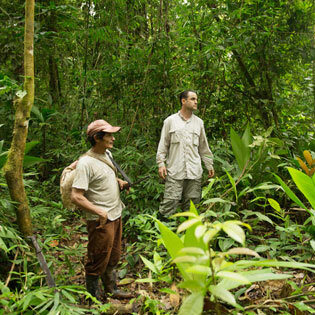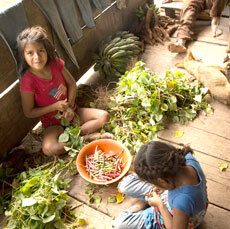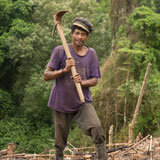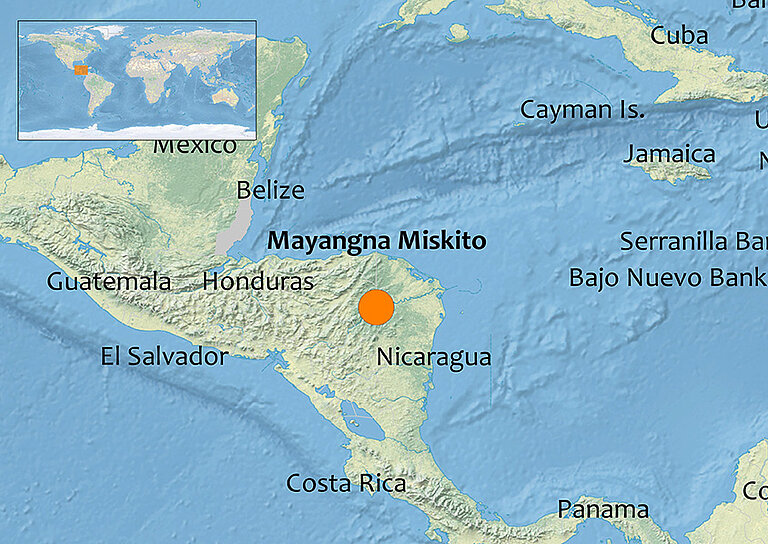Mayangna and Miskito - Bosawas Biosphere Reserve, Nicaragua



all pictures: © Debra Bardowicks
Site details
The Mayangna and Miskito inhabit Central America’s largest rain forest. Their subsistence strategies combine swidden horticulture with hunting, seasonal fishing, and the raising of livestock. Monetary income generally stems from artisanal gold mining and migrant wage labor. A minority of individuals hold salaried positions as schoolteachers. The inequality of material wealth is substantially. Politically, land tenure is a chronic concern to residents because of unchecked incursions by non-indigenous homesteaders. Descent is traced bilaterally, and cooperative labor is organized primarily around kinship. There is an uxorilocal bias in residence, which is oriented around nuclear families and flexible overall. Marriages are prescriptively monogamous. Divorce and remarriage are relatively common. Fertility is high, conventionally averaging over eight births per woman, but fertility is dropping substantially as women gain regular access to hormonal contraceptive methods.
Research
Research at this site focuses largely on longitudinal data collection on food production, social networks, demography, ethnobiological knowledge, anthropometrics, household economics, and time allocation. Alongside these panel data, the researchers conduct short-term research. In 2022, for instance, Koster and colleagues leveraged grant funding from the National Science Foundation, the Templeton Foundation, and the Max Planck Institute to examine the motivations and rewards for individual-level contributions to public infrastructure. Specifically, the community was provided all of the construction materials to build a new school building, which community leaders had previously cited as a necessity. The study was designed as a test of the Indirect Reciprocity Model, which asserts that generous, prosocial individuals are rewarded for their altruism by other group members. While the school was being constructed over a period of several months, the researchers recorded individuals’ daily time allocation to the effort and used heart rate monitors to document energetic expenditure while individuals were working. Both before and after the construction, the research team collected data via economic games, interviews on reputations, and social network surveys to examine how reputations changed as a function of effort and how altruistic support varies as a function of reputations.
Selected Publications
De Bacco, C., Contisciani, M., Cardoso-Silva, J., Safdari, H., Lima Borges, G., Baptista, D., Sweet, T., Young, J., Koster, J., Ross, C. T., McElreath, R., Redhead, D., & Power E. A. (in press). Latent network models to account for noisy, multiply-reported social network data. Journal of the Royal Statistical Society: Series A.
Lew-Levy, S., Reckin, R., Kissler, S. M., Pretelli, I., Boyette, A. H., Crittenden, A. N., Hagen, R. V., Haas, R., Kramer, K. L., Koster, J., O’Brien, M. J., Sonoda, K., Surovell, T. A., Stieglitz, J., Tucker, B., Lavi, N., Ellis-Davies, K., & Davis, H. E. (2022). Socioecology shapes child and adolescent time allocation in twelve hunter-gatherer and mixed-subsistence forager societies. Scientific Reports, 12:8054.
Eisenman, E., Koster, J., Fiorello, C., & Foley, J. (2021). Does wealth predict health among dogs in a protected area? Human Ecology, 49:795-808.
Koster, J. (2021). Most dogs are not NATIVE dogs. Integrative and Comparative Biology, 61:110-116.
Winking, J., & Koster, J. (2021). Timing, initiators, and causes of divorce in a Mayangna/ Miskito community in Nicaragua. Social Sciences, 10:212.
Koster, J., McElreath, R., Hill, K., Yu, D., Shepard Jr, G., van Vliet, N., Gurven, M., Trumble, B., Bliege Bird, R., Bird, D., Codding, B., Coad, L., Pacheco-Cobos, L., Winterhalder, B., Lupo, K., Schmitt, D., Sillitoe, P., Franzen, M., Alvard, M., Venkataraman, V., Kraft, T., Endicott, K., Beckerman, S., Marks, S., Headland, T., Pangau-Adam, M., Siren, A., Kramer, K., Greaves, R., Reyes-Garcia, V., Guèze, M., Duda, R., Fernández-Llamazares, A., Gallois, S., Napitupulu, L., Ellen, R., Ziker, J., Nielsen, M., Ready, E., Healey, C., & Ross, C. (2020). The life history of human foraging: Cross-cultural and individual variation. Science Advances, 6:eaax9070.
Bowland, G. B., Bernstein, R. M., Koster, J., Fiorello, C., Brenn-White, M., Liu, J., Schwartz, L., Campbell, A., von Stade, D., Beagley, J., Pomerantz, J., Gonzalez, A., Quick, M., McKinnon, K., Aghaian, A., Sparks, C., & Gross, J. B. (2020). Fur color and nutritional status predict hair cortisol concentrations of dogs in Nicaragua. Frontiers in Veterinary Science, 7:565346.
Koster, Jeremy, and Richard McElreath. "Multinomial analysis of behavior: statistical methods." Behavioral Ecology and Sociobiology 71, no. 9 (2017): 138.
Koster, Jeremy. "Family ties: the multilevel effects of households and kinship on the networks of individuals." Royal Society Open Science 5, no. 4 (2018): 172159.
Scelza, Brooke A., Sean P. Prall, Tami Blumenfield, Alyssa N. Crittenden, Michael Gurven, Michelle Kline, Jeremy Koster et al. "Patterns of paternal investment predict cross-cultural variation in jealous response." Nature Human Behaviour (2019): 1-7.
Koster, Jeremy, Dieter Lukas, David Nolin, Eleanor Power, Alexandra Alvergne, Ruth Mace, Cody T. Ross et al. "Kinship ties across the lifespan in human communities." Philosophical Transactions of the Royal Society B 374, no. 1780 (2019): 20180069
Koster JM, Leckie G. 2014. Food sharing networks in lowland Nicaragua: an application of the social relations model to count data. Social Networks 38:100-110.
Koster JM, Grote MN, Winterhalder B. 2013. Effects on household labor of temporary out-migration by male household heads in Nicaragua and Peru: an analysis of spot-check time allocation data using mixed-effects models. Human Ecology 41:221-37.
Koster JM. 2008. Hunting with dogs in Nicaragua: an optimal foraging approach. Current Anthropology. 49:935-44.
